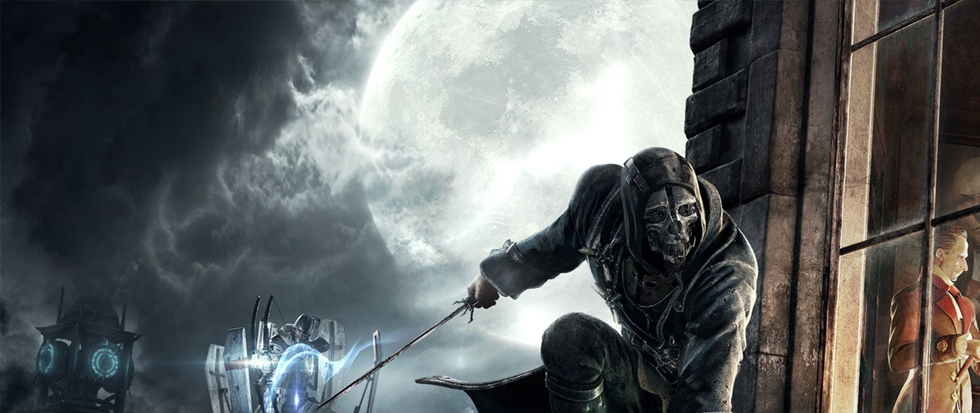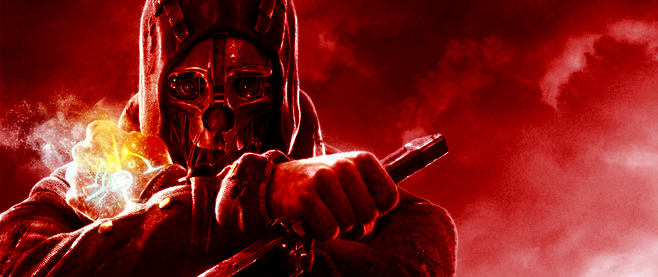
The Tangled Mess that is Dishonored’s Morality
I came to Dishonored almost immediately after finishing the Thief trilogy. The similarities are not subtle. However, Dishonored came out in a post-Bioshock world. Morality is important. Despite giving you a wide array of shiny weapons to graphically murder your enemies with, Dishonored attacks your decision to maim or kill – including the gratuitous buckets of blood that accompany any murder. Unfortunately, the game gets lost somewhere between a straightforward black-and-white morality play and a dismal take on our ability to make good choices. The result is a sloppy portrayal of morality that seems to suggest you should only help people if they give you a reward and sometimes the best solution is torture.
In this steampunk spin on a plague-ridden Victorian city named Dunwall, you play the assassin Corvo. I could talk about Corvo’s years of loyal service to the queen or how he joins the rebellion after her murder, but what defines Corvo most is his complete lack of personality. While this does allow you to project onto the character, it doesn’t allow Corvo to integrate into the world. He is quite literally voiceless and his interactions consist of receiving thanks or story exposition. The result is that his relationships and personality are nearly nonexistent. There’s no room for him to be anything other than a black-and-white entity. If you do your best not to murder the entire city, he will only be an altruistic, princess-saving hero. If you take the bloodbath route, he becomes a similarly one-dimensional monster. Corvo is our lens into Dunwall and his simple morality code is a poor frame for the complex moral decisions you have to make.
After joining the rebellion, Corvo goes into lockstep with Admiral Havelock’s plans. Only later do we realize Havelock is just as corrupt as the current regime and he intends to murder Corvo. This could have been a clever commentary on how we create black-and-white situations, assuming that because a group is fighting evil, it’s inherently good. But since Corvo has no reaction to the world, it goes by with a shrug. It was probably meant to be a moment of shock and hurt, but we haven’t spent any time developing our feelings towards the rebellion or Havelock. Despite being uninterested in morality, Thief still had a more purposeful moral arc. Garrett, the protagonist, doesn’t care if the world burns as long as he gets paid. In the third game, Deadly Shadows, you can work with the pagans or the Hammerites. If you do work with them, your selfishness is called into question when your allies begin protecting and harboring you. Corvo lacks personality and integration into Dunwall, so the betrayal passes without comment, even though it should bring into question your decision to follow Havelock’s questionable orders.
When Corvo is sent to eliminate an enemy, you can search out a nonlethal option. However, these alternatives are horrifying. Instead of killing the Pendletons, Slackjaw offers to cut out their tongues and force them to work in the mines. More disturbing, you can knock out Lady Boyle and hand her over to a supposed lover, who promises she will vanish forever. Will he whisk her away to safety or imprison and rape her? These could be moments that make you pause, realizing that no matter what you do, you are progressing through acts of violence. But the complexity of these issues remain underdeveloped and confusing.

If you play the entire game without killing anyone, you are awarded, ‘Clean Hands.’ When I looked up the Lady Boyle mission, horrified by the possibility that the game really was going to brush over the possible rape (it did), a lot of people said the reason they let her live was because they wanted to achieve Clean Hands. I get why this is here. The achievement establishes rules that make the game more challenging and then it rewards your effort. It’s also an easy way to scream, ‘Killing is bad!’ This would be fine for a black-and-white morality system. But Dishonored wants to be more complicated. Showing mercy is not necessarily better than murder and the people you are working for are just as corrupt as your enemies. You have enough weapons and healing potions to go on a murder spree. But if you do, there will be more guards, more violence and in the end everything will not be okay. You might still decide not killing your enemies is the right choice, but if you’re locked into that decision because you want an achievement, the morality is no longer playing a part. And when the game still tries to suggest that it does, you’re left with the message that torturing people is what a hero would do.
While in the city, you have several opportunities to help ordinary citizens: freeing them, leading them to safety and not murdering them on sight. If you do, they reward you. This is, admittedly, pretty common in videogames, but it feels jarringly simplistic in a game where you can infect dozens of innocents with the plague and sentence a prisoner to death by rats. Is this about a heroic hero saving a girl from the clutches of villainous villains or about a good man who discovers that in attempting to save the only person he cares about, he has destroyed dozens of lives and mindlessly followed a tyrant?
There are many instances where the storyline and mechanics fumble the more complicated morality system, but what confuses it the most is the fact that the protagonist is fundamentally a black-and-white character. The struggle between murdering, torturing or – occasionally – trusting his enemies has no effect on Corvo and complicated situations are constantly framed in simple terms of good and evil. When the simplistic moral, ‘killing is bad,’ is taken in the same context as the complex message, ‘sometimes there are no good choices,’ the result feels disjointed at best and disturbing at worst.
—
Sarah McGill is an author, game designer and all around meddler. She lives in New York and spends her spare time reading way too many books and having staring contests with the cat. Follow her on twitter @sarahemcgill



